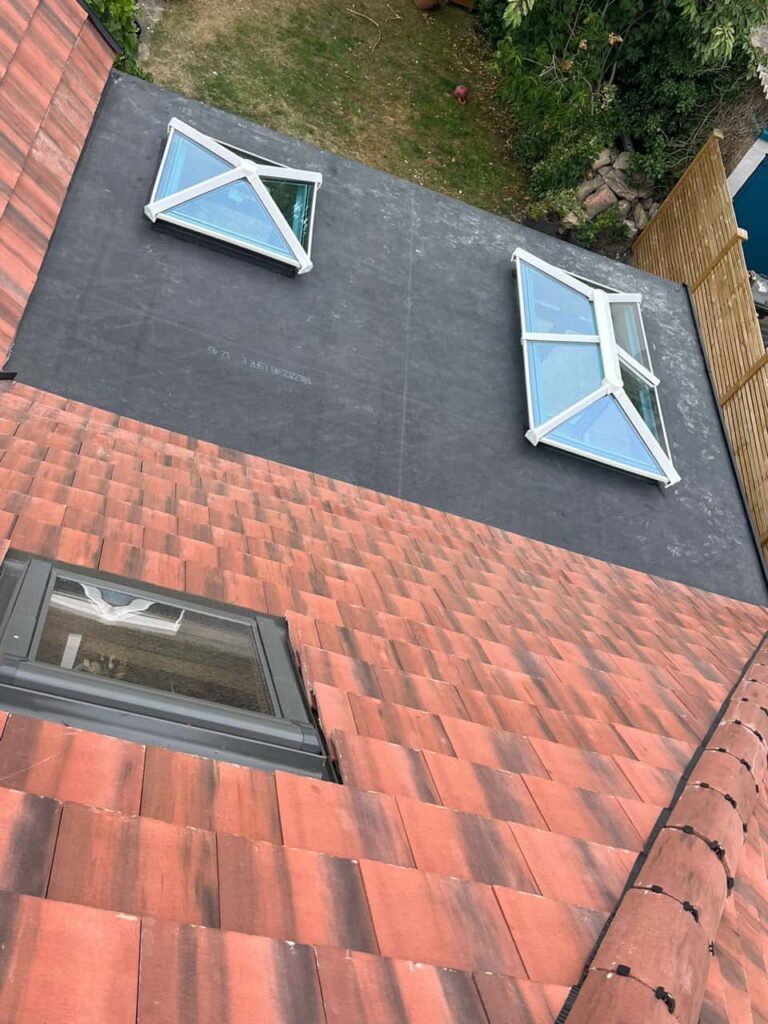Introduction
Your roof is one of the most critical components of your property—it protects your home from the elements, contributes to energy efficiency, and supports the structural integrity of the building. Yet, despite its importance, it’s easy to forget about your roof until something goes visibly wrong. Regular professional roof checks are essential for catching issues early and extending the lifespan of your roof.
At Calverton Roofing Repairs, we often get asked how frequently a roof should be inspected. The answer depends on several factors, including the age of the roof, local weather conditions, the type of roofing material, and recent storm activity. In this post, we’ll guide you through when and why you should schedule professional roof inspections, and how doing so benefits your home in the long run.
Why Regular Roof Checks Matter
A professional roof inspection helps identify problems before they develop into expensive repairs. Even minor damage—like a loose tile or cracked flashing—can lead to water ingress, structural weakening, and internal damage if not addressed promptly.
The benefits of regular inspections include:
- Early detection of leaks or deterioration
- Prolonged roof lifespan through preventative maintenance
- Improved energy efficiency
- Peace of mind knowing your roof is in sound condition
- Compliance with property maintenance best practices
A trained roofing professional can spot hidden damage that the untrained eye may overlook, especially in areas that are difficult or unsafe for homeowners to access.
General Guidelines: How Often Should You Book a Roof Inspection?
While every roof is unique, the following general recommendations apply to most properties in Calverton and throughout Nottingham:
Once Every Year – As a Preventative Measure
An annual roof inspection is considered best practice for most homes, especially those with roofs over 10 years old. This allows roofing professionals to assess the overall condition, detect early signs of wear, and recommend any minor repairs before they become serious.
After Severe Weather Events
Following strong winds, heavy rainfall, hail, or snowstorms, it’s wise to have your roof checked—even if there are no obvious signs of damage. Storms can loosen tiles, damage flashing, or cause water pooling that may not be visible from the ground.
Before Buying or Selling a Property
A roof inspection is essential before purchasing a new home. It ensures you know the condition of the roof and whether immediate work is needed. Sellers can also benefit from an inspection to address any potential issues and avoid delays in the sales process.
For Older Roofs – Every 6 to 12 Months
If your roof is over 20 years old, more frequent checks—every 6 months—are recommended. Older materials can deteriorate more quickly, and early intervention can help prolong the roof’s useful life without the need for a full replacement.
Signs That You Should Schedule a Roof Inspection Sooner
Even with regular checks, certain warning signs mean you shouldn’t wait until your next scheduled visit. Contact a professional if you notice:
- Water stains or damp patches on ceilings or walls
- Missing, cracked, or slipped roof tiles
- Sagging sections of the roof or guttering
- Unusual spikes in heating costs (may indicate insulation issues)
- Moss or algae build-up on the roof surface
- Debris or granules in your guttering
These symptoms could point to underlying damage that, if left untreated, may worsen with time.
Roofing Materials and Their Inspection Needs
Different roofing materials have varying lifespans and maintenance requirements. Here’s a quick guide:
Tile or Slate Roofs
Durable and long-lasting, but tiles can crack or slip. Annual inspections help ensure that minor faults are corrected early.
Flat Roofs (Felt, EPDM, GRP)
More susceptible to pooling and membrane damage. These should be inspected at least once a year, and after storms.
Metal Roofs
Resistant to weather but can suffer from corrosion or loose fixings over time. Schedule checks every 12–18 months depending on age and exposure.
The Value of a Professional Inspection
While homeowners can perform a basic visual check from the ground, a professional roofing contractor provides a far more thorough evaluation. At Calverton Roofing Repairs, our inspections include:
- Examination of tiles, slates, and membrane
- Flashing and gutter assessment
- Chimney stack and ventilation checks
- Moss and debris removal recommendations
- Roofline and drainage condition analysis
A well-documented inspection can also serve as a valuable maintenance record, particularly useful when selling or insuring your home.
Conclusion
Your roof works tirelessly to protect your home from the elements, and regular professional inspections are the best way to ensure it continues to do so effectively. Whether your roof is brand new or a few decades old, routine checks help identify small problems before they turn into costly repairs.
At Calverton Roofing Repairs, we offer detailed roof inspections and honest advice tailored to your home’s needs. Serving properties throughout Calverton and the wider Nottingham area, our expert team is here to help you protect your investment with reliable, professional care. Contact us today to schedule your next roof check and keep your property safe, dry, and secure all year round.
Call us on: 0115 647 1193
Click here to find out more about Calverton Roofing Repairs
Click here to complete our contact form and see how we can help with your roofing needs.

